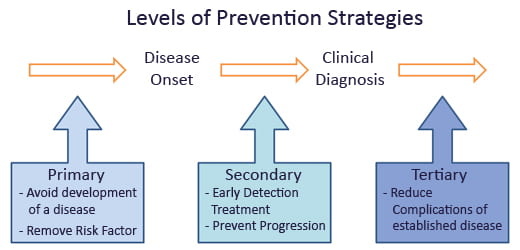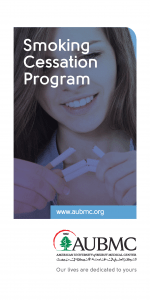ABOUT THE CANCER PREVENTION & CONTROL PROGRAM
CANCER CONTINUES TO BE A MAJOR BURDEN ON OUR HEALTH SYSTEM. ONE THIRD TO A HALF OF CANCERS CAN BE PREVENTED IF PROPER DETECTION AND PREVENTION STRATEGIES WERE IMPLEMENTED.
- Accordingly, and to further enhance our war on Cancer, the Cancer Prevention and Control (CPCP) Program committee at the Naef. K. Basile Cancer Institute was founded in 2016. In line with AUB’s vision on health, the CPCP program aims at helping the community prevent cancer through awareness, education, prevention, the promotion of proper screening means as well as research.
- The program Director, Dr. Hiba Moukadem, Assistant Professor of Clinical Medicine at the NKBCI follows Dr. Rihab Nasr who directed this program at its initiation. She will continue on working with clinicians, researchers, health related organizations, NGOs, leaders of governmental organizations as well as policy makers to increase awareness about cancer and cancer prevention in Lebanon and the region

Most common cancers in Lebanon
- The Naef K. Basile Cancer Institute and its Cancer Prevention and Control Program are members of the Union for International Cancer Control (UICC), a leading worldwide organization that unites and supports the cancer community to reduce the global cancer burden, promote greater equity, and ensure that cancer control continues to be a priority in the world health and development agenda.
CURRENT UICC MEMBERSHIP COMPRISES MORE THAN 1,188 MEMBER ORGANISATIONS IN 172 COUNTRIES AND CONTINUES TO GROW
- The UICC’s network brings together cancer leagues and societies; research institutes; treatment centres, hospitals, scientific and professional societies; ministries of health, public health agencies; and patient support organisations to shape cancer control on a global scale.
- Each year, the Institute and the Program mobilizes on World Cancer Day, a global uniting initiative and movement led by the UICC acting as a powerful reminder that we all have a role to play in reducing the global impact of cancer, and unite under one voice to face cancer, one of the greatest challenges in history.
MISSION AND VISION
CPCP MISSION
The CPCP is committed to helping the community prevent cancer and decrease the burden of this disease through education, screening, counseling and research.
CPCP VISION
The CPCP’s vision is to have a holistic cancer prevention and control program that targets patients before, during and after cancer. The CPCP will lay the foundations and set the standards in the field of cancer prevention and control in the Middle East and North Africa region.
PROGRAMS
The CPCP committee, through its interdisciplinary and engaging structure, focuses on a cancer prevention and control continuum that ranges from Primary to Secondary to Tertiary prevention.

The CPCP program has 4 main areas of focus:
- Awareness and Education: To increase public knowledge about cancer and how to identify and reduce cancer risk factors: namely by helping people change their behavior and lifestyle such as smoking habits, unhealthy diets, maintaining a healthy weight and a good level of physical activity and more…
- Cancer Screening and early detection: To step up the detection of cancer in the preclinical phase: the earliest the cancer stage, the more effective the treatment. This component will promote and support some of the effective tests that people should have at certain ages for early detection.
- Survivorship: Aims to strengthen our understanding of cancer survivorship and encourage targeted interventions to ensure good quality of life of patients after recovery from cancer.
- Research: Focuses on innovative pre-clinical, translational, clinical and epidemiological research leading to better prevention, treatment and control of cancer.
COMMUNITY OUTREACH ACTIVITIES
- The CPCP engages in different cancer-related awareness campaigns throughout the year and supports efforts to create a greater awareness of cancer.
- Planned awareness events usually follow a calendar of cancer months and dates recognized and observed by internationally acknowledged, non-profit organizations that provide support and education about cancer.
- During the Covid-19 pandemic, online awareness sessions responded to the need to format cancer prevention awareness initiatives within the context of the limitations imposed by the pandemic.
- Awareness dates like months, weeks, and days are important as they rally us together for a common cause to show solidarity, spread awareness and show support.
- The NKBCI’s mission to prevent and raise awareness about cancer in order to improve the lives of those affected finds no better channel than community outreach events, creating positive empowerment for the public and those living with health conditions and their loved ones.
- The CPCP makes use of the educational material it develops and shares it with collaborating NGOs to disseminate information about cancer.
VIEW ALL EVENTS
SCHOLARLY ACTIVITIES
The CPCP’s scholarly activities focus on:
- Finalizing various educational and informational materials on cancer in print and digital form, booklets on cancer management and prevention, development and design of reader friendly infographics for preventable cancers prevention and tobacco related topics and more digital media cancer related resources
- Hosting international motivational speakers
- James Herbert, Professor of Epidemiology, Community Medicine and Biostatistics, Director of University of South Carolina Cancer Prevention Program.
- Lifang Hou, Professor of Preventive medicine, member of the national Blue Ribbon Panel, Northwestern University
- Akram Ghantous, Faculty Member – International Agency for Research on Cancer
- Victoria Seewaldt, Ruth Ziegler Professor and Chair of the Department of Population Science at City of Hope and Associate Cancer Center Director
- Publications:
- National cancer control plans across the Eastern Mediterranean region: challenges and opportunities to scale-up. Fadhil I, Alkhalawi E, Nasr R, Fouad H, Basu P, Camacho R, Alsaadoon H. Lancet Oncol. 2021 Nov;22(11):e517-e529. doi: 10.1016/S1470-2045(21)00410-1. PMID: 34735820.
- Impact of the COVID-19 pandemic on smoking behavior and beliefs among the American University of Beirut community. Ghadban, Zgheib, Romani, Bou Akl and Nasr. Tobacco Prevention and Cessation. 2022, vol 8, January.
- Primary care and pulmonary physicians’ knowledge and practice concerning screening for lung cancer in Lebanon, a middle-income country. Bou Akl, Zgheib, Matar, Mukherji, Bardus and Nasr. Cancer Medicine. 2021; 00:1–8
- Knowledge, beliefs, and practices related to cancer screening and prevention in Lebanon: community and social media users’ perspectives.
- Giant Inflatable Colon Model Enhances Lebanese Community Knowledge and Intention for Colorectal Cancer Screening. Baassiri, El-Harakeh, Itani, Nassar, Safi, Dassouki, Romani, Zgheib and Nasr. JCO Global Oncology. 2020; 6:167-173, American Society of Clinical Oncology.
- Giant Inflatable Colon Enhances Community Knowledge and Intention for Colorectal Cancer Screening. Rihab Nasr, on behalf of the Cancer Prevention and Control Program, Naef K. Basile Cancer Institute and AMALOUNA team, American University of Beirut, Lebanon. The poster was presented at WCC 2018 and published in: Journal of Global Oncology 2018 4:Supplement 2, 131s-131s.
- Presentation of our CRC collaborative initiative “A collaborative Initiative to raise awareness about colorectal cancer and to encourage CRC screening” at WCC 2018. This initiative was among the 3 collaborations selected to be presented at UICC out of 11 submissions from the Middle East and North Africa region and based on a scoring process.
- Our events are published on the map of Impact of the World Cancer Cay/ UICC website
PREVENTION TIPS
VIEW ALL BROCHURES
- The CPCP actively fosters the development of informational resources in different media forms (print and digital) on cancer prevention while directing its awareness efforts on two main elements for cancer prevention in Lebanon: promoting early screening for cancer and tobacco cessation by sharing continuous knowledge on the carcinogenic risk of tobacco in its many forms.
- Information media developed, designed and produced at NKBCI by the CPCP is used in the program’s various community outreach activities, planned health awareness campaigns and events, and shared with collaborating NGOs.
- Prepared information may also support disease awareness on NKBCI Blood Diseases Program: namely Iron Deficiency and Thrombosis.
Learn more with our user-friendly informedia resources in English & Arabic by clicking on the hyperlinks to our dedicated Pinterest account:
Prevention and screening:
- Avoiding tobacco
- Getting screened
- Getting vaccinated
- Weighing healthy
- Limiting alcohol
- Eating healthy
- Protecting your skin
- Staying active
Cancer Screening:
- Screening for lung cancer English/Arabic
- Screening for colorectal cancer English/Arabic
- Screening for prostate cancer English/Arabic
Diseases:
- Prostate cancer English/Arabic
- Testicular cancer English/Arabic
- Pancreatic cancer
- PSA level journal + PSA infographic
Blood disorders:
EDUCATIONAL MATERIAL
- The CPCP actively fosters and promotes the development and dissemination of informational and awareness resources on various topics related to the prevention, management and treatment of cancer.
- As such the CPCP aims to be an information resource hub on cancer. While focusing on the importance of cancer screening and tobacco control; the information the CPCP puts forward accounts for the most frequently diagnosed diseases, published local research, and tobacco smoking as a main risk factor.
- Resources developed at NKBCI by the CPCP are used in the program’s various community outreach activities and shared with collaborating NGOs: planned health awareness campaigns and events for the public whether for an adult public audience, schools or at AUBMC grounds for patients and caretaker families. After being reviewed by our medical specialists, infosheets and booklets are published through both the Patient Affairs and Communications departments and feature online at our dedicated Information material page.
VIEW ALL EDUCATIONAL MATERIAL
ALLIED PROGRAMS
- The CPCP works closely with allied programs and medical departments at AUBMC in its mission to raise awareness about preventing cancer and decreasing the burden of this disease through education, screening, counseling and research.
- The Cancer Prevention and Control Program also seeks to collaborate and build combined efforts with organizations working on cancer control.
A. SMOKING CESSATION PROGRAM:
- In its focused approach on tobacco control for cancer prevention, the CPCP supports the action of the smoking cessation program at the Health & Wellness Center at AUBMC: For more information please consult the following link: Smoking Cessation Program.
- Enrollment in the program consists of 8 sessions of counseling and therapy under the supervision of a certified dietician, nurse and physician.
- Each session is 45 minutes. The program uses group or individual counseling sessions and is based on American (promoted by both the American Lung Association and National Cancer Institute) and international clinical guidelines. This involves taking medications (nicotine replacement therapy and others), learning behavior modification, and follow-up (up to one year).
The program is suitable for all those wishing to quit cigarettes or narjileh.
More information on the Smoking Cessation Program can be found by clicking on this link: Smoking Cessation Program
For those considering quitting smoking and looking for help, the Smoking Cessation Program can be reached on 81-677422 or 01-350000, ext. 8030.
COMMITTEE MEMBERS
Chairperson: Hiba Moukadem, M.D. Clinical Instructor, Hematology – Oncology
Members
Dr Salim Adib, Professor of Practice, Faculty of Health Sciences
Dr. Nour Moukalled, Instructor of Hematology Oncology, Department of Internal Medicine
Dr. Hazem Assi, Professor, Assistant Professor of Clinical Medicine, Department of Internal Medicine
Dr. Yasser Shaib, Professor of Clinical Medicine, Director of Endoscopy and Bronchoscopy Unit
Dr. Jihan Bou Rahhal, Associate Professor, Department of Dermatology
Dr. Albert Hajj, Associate Professor, Head of Division – Urology
Dr. Maya Romani, Assistant Professor, Department of Family Medicine
Dr. Rihab Nasr, Professor in Cell Biology, Department of Anatomy
Dr. Nathalie Zgheib, Associate Professor, Department of pharmacology and toxicology
Dr. Dina Chamsi, Assistant professor, Department of Obstetrics and Gynecology
Dr. Hisham Bou Fakhreddine, Assistant Professor, Division of Pulmonary medicine
Dr. Zahy Abdul Sater, Global Health Institute
Ms. Marly Azzi, LOIG representative
Ms. Nada Kashmar, NKBCI administrator
REACH US
Hiba Moukadem, M.D.
Clinical Instructor, Hematology – Oncology
Director Cancer Prevention & Control Program
Ext: 7980
Rihab Nasr, PhD
Associate Professor, Anatomy, Cell Biology & Physiological Sciences
Consultant Cancer Prevention & Control Program
Ext: 4812
Dima Karam, MPH, MA Health Education, MA Health Communication
Health communication specialist
Naef K. Basile Cancer Institute
Dk08@aub.edu.lb
Ext: 5111
Nada Kashmar, MBA, HMQ
Clinical Department Administrator
Naef K. Basile Cancer institute
nk113@aub.edu.lb
Ext: 7903
QUICK LINKS



